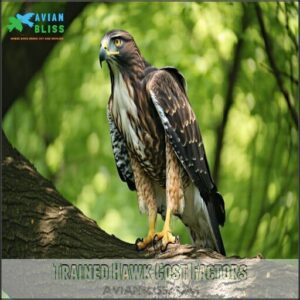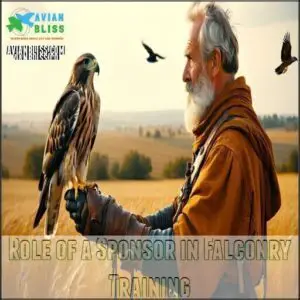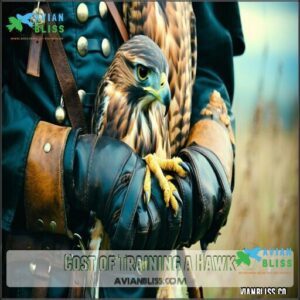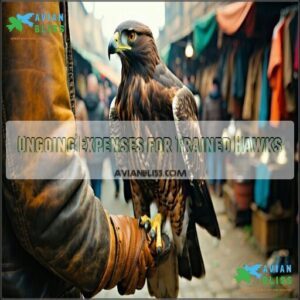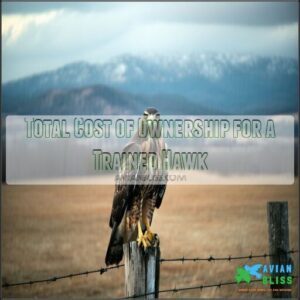This site is supported by our readers. We may earn a commission, at no cost to you, if you purchase through links.

Don’t forget the extra $1,000 for essential gear like gloves and tracking equipment.
Ongoing costs include $75-$100 monthly for food and $200-$500 annually for vet care.
Before taking the plunge, you’ll need proper licensing—apprentice falconers must train under a sponsor for two years.
Like chess masters studying their boards, successful falconers invest time understanding their birds’ behaviors.
The initial investment seems steep, but many falconers find the partnership with these magnificent hunters worth every penny, as they develop a deep understanding of their birds’ behaviors.
Table Of Contents
- Key Takeaways
- Trained Hawk Cost Factors
- Licensing Requirements for Trained Hawks
- Choosing The Right Trained Hawk
- Training a Hawk: Time and Effort
- Cost of Training a Hawk
- Ongoing Expenses for Trained Hawks
- Total Cost of Ownership for a Trained Hawk
- Frequently Asked Questions (FAQs)
- How much does a trained hawk cost?
- How much does an untrained Hawk cost?
- How much does it cost to own a hawk?
- How long does it take to train a red tailed hawk?
- How is a hawk trained?
- How much does it cost to monitor a hawk?
- How long does it take to become a hawk?
- How much is it to buy a trained hawk?
- How much do falconers charge?
- Can you buy a hawk as a pet?
- Conclusion
Key Takeaways
- You’ll need to budget $800-$5,000 initially for a trained hawk, with Harris Hawks ($1,000-$2,500) being more affordable for beginners than rare species like Gyrfalcons.
- You’ll spend $75-$100 monthly on food and $200-$500 annually on veterinary care, plus you’ll need to invest about $1,000 for essential equipment like gloves, jesses, hoods, and tracking devices.
- You can’t legally own a hawk without proper licensing, which requires passing a written exam and completing a two-year apprenticeship under an experienced sponsor’s guidance.
- You’ll need to commit 2-3 hours daily to training and maintaining your hawk, developing a relationship that many falconers find rewarding despite the significant time and financial investment.
Trained Hawk Cost Factors
When you’re pricing a trained hawk, several factors shape the cost, from species and training level to breeder reputation.
Understanding these details helps you plan for both the initial purchase and ongoing expenses.
Initial Purchase Price of a Trained Hawk
The trained hawk cost mostly hinges on factors like species, training level, and breeder reputation.
Here’s what you need to know:
- Species Pricing: Harris Hawks are ideal for starters ($1,000–$2,500), while rare breeds, like Gyrfalcons, command premiums.
- Training Level: Fully trained hawks range from $1,500–$2,500, given their hunting skill.
- Breeder Reputation: Reputable breeders often charge higher prices, ensuring quality.
Ultimately, expect a hawk purchase price starting at $1,000 and climbing beyond $5,000.
You’ll also need to factor in ongoing expenses like specialized food and veterinary care.
Cost of Equipment and Supplies
Outfitting yourself with falconry equipment is essential for safety and control. Invest in quality jesses, gloves, and hoods, as durability and good materials guarantee reliability.
A sturdy perch is a must, with basic options starting at $30. Don’t skimp on telemetry costs for tracking your hawk.
Reliable falconry equipment costs upfront, but well-made gear pays off long-term. A little planning guarantees you’re always ready for action!
Prices can vary, but consider the falconry jesses cost when budgeting for your equipment.
Ongoing Care and Maintenance Expenses
Hawk care isn’t cheap, but it’s rewarding when you’re prepared.
Expect hawk food costs of $15–$30 weekly, with meals like mice or quail. Veterinary care averages $200–$500 yearly, though emergencies might soar past $2,000. Equipment upkeep, from replacing jesses to maintaining perches, runs around $50–$150 annually.
Hawks thrive with enrichment activities and proper housing that suit their wild instincts. Here’s a quick breakdown:
- Food and diet: $800–$1,200 annually.
- Veterinary costs: Plan $200–$500+ yearly.
- Equipment upkeep: Repairs range $50–$150 yearly.
- Housing needs: Strong, secure mews are non-negotiable.
Proud hawk ownership means ongoing financial responsibility!
Licensing and Permit Fees
Before owning a hawk, you’ll need a falconry license. Here’s the deal:
- Permit types: Apprentice, general, master levels.
- Permit application process: Pass a written falconry exam.
- Renewal requirements: Licensing fees range from $40–$125 every five years.
- State-specific regulations: Rules and costs vary.
- Legal ramifications: Skipping permits violates federal laws like the Migratory Bird Treaty Act.
Veterinary Care and Health Certificates
In regards to hawk healthcare, preventative care is your best ally. Annual vet visits cost $200–$500, covering routine check-ups and vaccines to keep your hawk in top shape.
Emergency treatment, like fixing broken feathers or treating infections, can soar past $2,000—worth it for peace of mind. Exotic vets specialize in hawk care and guarantee certificate validity for legal travel.
New hawks or relocations may require quarantine. Health certificates, often mandatory, are key for transport or regulatory compliance.
- Essentials: Preventative care, emergency treatment, certificate validity.
- Common issues: Parasites, injuries, infections.
- Planning ahead: Consider insurance options for unexpected costs.
Licensing Requirements for Trained Hawks
If you’re thinking of owning a trained hawk, you’ll need to meet strict licensing requirements first.
Understanding federal laws, state permits, and annual reporting rules is essential to stay compliant and avoid hefty fines.
General or Master Falconry Permit
A General or Master Falconry Permit shows you’re serious about falconry.
To qualify, pass a challenging exam covering falconry regulations, bird care, and hunting ethics. Maintain compliance with federal rules and annual permit renewals.
Take a look:
| Requirement | Purpose | Cost/Time |
|---|---|---|
| Written Exam | Test falconry qualifications | $50–$125 |
| Mentorship Programs | Advanced training guidance | 2 years |
| Hunting Privileges | Legal hunting with hawks | $50–$200 annually |
| Permit Renewal | Confirm compliance | Every 3-5 years |
| Species Restrictions | Govern hawk ownership | Varies |
Violations? Expect hefty penalties, so stay sharp!
State-Specific Regulations and Fees
State-specific regulations can feel like traversing a maze, but they’re key to earning your falconry license.
Rules vary widely depending on where you live, covering everything from licensing fees to hunting zones. Some states give you a few years before renewing a license, while others expect yearly check-ins.
Expect a mix of requirements:
- Permit reciprocity may exist, but some states stick to local falconry regulations.
- Written exams often test your knowledge of species restrictions.
- Hunting seasons and permitted areas are tightly regulated.
- Facility inspections guarantee your hawk has proper housing.
- Licensing fees range depending on the state’s structure.
Understanding these intricacies saves headaches—and keeps you within the law.
Federal Laws and Regulations
The Migratory Bird Treaty Act ensures hawks stay protected, making federal permits a must for compliance. If you’re thinking about crossing state lines, remember Interstate Transport rules require accurate paperwork.
Planning international travel? CITES regulations oversee hawks traded across borders, so don’t skip the red tape.
Ignoring these federal laws isn’t worth the risk. Illegal hawk ownership can trigger steep legal penalties and even confiscation.
Plus, these rules support conservation efforts through programs like captive breeding. Sure, managing permit compliance takes patience, but it’s vital to ethical falconry.
Protecting hawks guarantees their role in ecosystems remains secure. When in doubt, follow the process—it’s better than dealing with fines or trouble.
Annual Reporting Requirements
Staying on top of your annual reporting guarantees smooth falconry and legal compliance.
Follow these essentials:
- Mark report deadlines for hunting activity and mortality records to meet federal laws.
- Keep data accuracy sharp—inspectors may audit your records.
- Organize records for compliance audits tied to state-specific regulations.
- Track regulation updates for amendments to stay aligned with current standards.
Master these steps, and you’re golden—no regulation hassles!
Choosing The Right Trained Hawk
Choosing the right trained hawk depends on your experience level, budget, and goals.
From sociable Harris Hawks to powerful Red-Tailed Hawks, understanding each species’ traits will help you make the best match.
Harris Hawks as a Popular Choice
Harris Hawks are a standout for aspiring falconers, blending beginner-friendliness with unmatched social nature.
Harris Hawks are perfect for beginners—smart, social, and ready to bond, making falconry both approachable and exciting to learn.
They’re enthusiastic learners, making falconry training smooth and rewarding. These adaptable birds bond with handlers, often feeling like team players rather than tools.
Trained hawk costs for Harris Hawks range from $1,000 to $2,500.
This reflects their hunting ability, intelligence, and ease of care—which keeps hawk ownership costs manageable. Their cooperative temperament and training ease make these birds a go-to choice for anyone seeking a reliable, personable companion in the falconry world.
Factors to Consider When Selecting a Hawk Species
Choosing the right hawk species means balancing temperament, hunting style, and your setup’s size.
Think about what fits your lifestyle and local regulations. Harris Hawks are sociable and beginner-friendly, while Red-Tailed Hawks are steady and sturdy.
Want specifics? Here’s what to weigh:
- Species Temperament: A feisty Kestrel or a steady Harris Hawk—what works for you?
- Hunting Style: Open areas favor Red-Tailed Hawks; tight forests suit Cooper’s Hawks.
- Size Constraints: Smaller hawks need less housing space.
- Local Regulations: Check permits before bringing your bird home.
Importance of a Hawk’s Temperament and Hunting Ability
The temperament and hunting prowess of a hawk shape its success in the field.
A calm, focused bird thrives in training and hunt, while bold hawks handle pressure like pros.
Matching temperament with training creates a powerful bond between you and your hawk.
- Steady temperament: Keeps the bird focused under pressure.
- Confidence: Handles challenges during prey capture with ease.
- Quick adaptability: Adjusts to varied environments and hunting scenarios.
- Trainable nature: Responds well to consistent guidance and rewards.
- Hunting instincts: These natural skills determine success in the field.
When hunting ability meets training, you’ll command a true partner.
Breeder Reputation and Quality of Birds
A great breeder is like a backstage pass to a well-bred, high-performing hawk. A solid hawk breeder reputation guarantees fewer headaches and a strong foundation for success.
Take time to evaluate their approach to captive breeding and how they handle hawk health and lineage importance. Always dig deeper!
- Confirm lineage: A good history means better genetic health and bird temperament.
- Assess training potential: Ask how the breeder prepares hawks for falconry.
- Request health guarantees: Cover yourself from costly surprises later.
- Research breeder ethics: Connect with trusted falconry communities for reviews.
- Match species to goals: Make certain the hawk fits your needs and budget.
Reliable breeders make your hawk’s initial purchase price worth every penny.
The Cooper’s Hawk, for example, exhibits adaptations for bird hunting, making them skilled predators.
Training a Hawk: Time and Effort
Training a hawk takes time, patience, and a lot of effort every day.
You’ll need to build trust, practice flight commands, and refine hunting skills while staying committed to the process.
Daily Care and Interaction Requirements
Caring for your hawk takes daily feeding, mews cleaning, and attention to weight management.
Build trust through bonding activities like enrichment needs—perch updates or interactive toys keep their minds sharp.
Watch feathers, talons, and behavior daily to track their health.
Hawk care costs include food supply and enrichment activities, but consistent care guarantees a strong bond and happy, thriving hawk.
Time Commitment for Training and Hunting
Training a hawk is a rewarding journey requiring dedication, patience, and consistent effort.
Expect to spend 2–3 hours daily honing their instincts and building trust. This commitment is a mix of art and discipline, and the payoff? A bond like no other.
Here’s what your hawk training time involves:
- Daily training: Flight exercises to build confidence and skill.
- Hunting frequency: Perfect movements and handling techniques.
- Seasonal adjustments: Adapt routines as weather and prey shift.
- Skill progression: Months to years of persistence before mastery.
Hawk training effort isn’t instant, but every session strengthens your connection and hunting precision.
Importance of Patience and Dedication
Training hawks takes patience and unwavering dedication. It’s not just a task; it’s a long-term commitment that tests your resolve.
You’ll spend hours on feeding, handling, and building trust, often without immediate results. Hawk training patience means showing up daily—even when things go wrong or progress stalls.
Avoiding frustration is tough, but staying calm and consistent helps. Overcoming challenges like stubborn behavior or slow bonding takes emotional resilience.
In time, your consistent effort forms a strong connection. The reward? A reliable partnership that makes the time commitment with your hawk truly worthwhile.
Role of a Sponsor in Falconry Training
Building trust with your hawk isn’t just about patience—it’s also about having the right mentor.
A sponsor is your lifeline in falconry training, teaching you everything from ethical guidance to handling skills. They simplify complex regulations while connecting you to the falconry community.
Like eagles, hawks also employ soaring techniques to conserve energy.
Here’s what they do:
- Mentorship Benefits: Learn hawk training and care essentials.
- Legal Compliance: Navigate licenses and avoid costly mistakes.
- Skill Development: Hone techniques under expert supervision.
Your sponsor makes this demanding journey achievable.
Cost of Training a Hawk
Training a hawk isn’t cheap, but it’s a vital part of falconry. Between equipment, permits, and guidance from an experienced sponsor, the costs can add up quickly.
Cost of Falconry Equipment and Supplies
Starting falconry? Invest wisely in essential hawk training gear to avoid headaches later. Quality matters, especially for durability and safety.
- Reliable telemetry systems: Vital for safely tracking your hawk during hunts.
- Durable hawk jesses and hoods: These withstand daily use, so opt for tough materials.
- Comfortable, sturdy perches: Your hawk needs proper rest between training sessions.
Cutting costs on glove quality or hunting gear can backfire. Expect to spend $200–$500 initially on reliable falconry equipment.
You can find various types of essential falconry equipment online. Remember, high-quality tools, like telemetry or hawk jesses replacements, save money and stress over time!
Cost of Travel and Accommodations for Hunting
Hunting trips add to your hawk’s training costs. Along with transportation fees, you’ll need to budget for lodging, meals, and hunting gear.
A short trip might cost $200–$500 depending on the hunting location and trip duration.
Here’s a quick cost breakdown:
| Expense | Average Cost | Notes |
|---|---|---|
| Fuel | $50–$150 | Based on distance traveled |
| Accommodation Costs | $50–$200/night | Hotels or campgrounds |
| Hawk Transport Cases | $30–$100 | Protects during interstate transport |
| Meals | $20–$50/day | Snacks included |
| Miscellaneous | $10–$40 | Parking or unexpected items |
Share costs when you carpool—it saves money and fuels great hunting stories!
Cost of Veterinary Care and Health Certificates
Keeping your hawk in top shape takes more than love—it requires consistent veterinary care, which can be a major expense.
Here’s a breakdown:
- Preventative Care: Routine check-ups range between $200 and $500 annually, ensuring your hawk’s health stays on point.
- Emergency Treatment: Accidents happen. Emergency costs often exceed $500 per visit.
- Certificate Costs: Need to travel? Health certificates for interstate or international trips cost $45 to $100.
- Specialist Consults and Surgery: Depending on the issue, complex procedures can skyrocket to $2,000 or more.
Budgeting for pet insurance or an emergency fund (around $1,000) offers peace of mind.
Avian health isn’t just an expense—it’s an investment in your hawk’s future success and happiness.
Cost of Licensing and Permit Fees
Don’t overlook the legal side of falconry—licensing is vital and comes with costs.
Fees vary but depend on permit duration and license levels. Here’s a quick breakdown:
| Permit Type | Cost | Renewal |
|---|---|---|
| Falconry License | $30–$125 | Every 1-3 years |
| Hunting License | $50–$200 | Annually |
| Import Permit | $200–$500 | Per transaction |
| Federal Permits | $40–$125 | Every 3-5 years |
| Inspection Fee | $259 | Per visit |
Federal regulations guarantee legal prerequisites and interstate transport compliance. Skipping these can ground your hawk dreams.
Ongoing Expenses for Trained Hawks
Caring for a trained hawk isn’t cheap, but it’s essential to their health and well-being.
From weekly food costs to replacing worn equipment, you’ll need to budget carefully to keep your feathered partner thriving.
Cost of Food and Supplies
Feeding your hawk isn’t just about tossing it scraps—it’s a commitment to their health and hunting sharpness.
Feeding a hawk isn’t just filling a dish—it’s fueling the precision and power that makes these hunters legendary.
Weekly food bills can range from $15 to $30, depending on the hawk’s size, seasonal adjustments, and feeding frequency. Their menu might feature mice, quail, feeder rabbits, or other high-protein meals that mirror a hawk’s natural diet.
Monthly costs add up fast, often landing between $200 and $650.
Smart falconers stock up on hawk food types in bulk, using a dedicated freezer to keep food fresh while cutting lifetime costs. Reliable hawk food supply chains are a must to avoid last-minute scrambles.
Don’t forget supplement costs or enrichment items like bath containers, which guarantee both a balanced diet and mental stimulation for your raptor. Proper bird nutrition essentials include high-quality protein sources and necessary supplements.
Cost of Equipment Maintenance and Replacement
Equipment upkeep is a key part of caring for your hawk.
Jesses replacement, hood maintenance, and perch repair run about $50–$150 yearly. Inspect your falconry equipment monthly—frayed gloves or worn perches can risk your hawk’s safety.
Don’t overlook telemetry upkeep, as batteries need swapping every 3–6 months, costing about $40 annually. A quality gear bag prevents damage during hunts and extends glove longevity.
Proper maintenance can be aided by specialized falconry products. Many falconers rely on a maintenance schedule to track repairs.
These proactive steps keep equipment costs manageable while ensuring your hawk stays safe and ready for action!
Total Cost of Ownership for a Trained Hawk
Owning a trained hawk isn’t just about the upfront cost—it’s a long-term financial commitment.
From food and equipment to permits and health care, the total cost adds up quickly over time.
Initial Purchase Price and Licensing Fees
Ready to get started with falconry? Here’s the breakdown:
- Hawk price: Expect $1,000-$5,000 for a trained hawk, influenced by species, training level, and breeder reputation.
- Licensing fees: Falconry licenses cost $40-$150, varying by state.
- Legal compliance: Permits are non-negotiable, ensuring you meet strict hawk ownership and falconry requirements for a smooth experience.
Cost of Training and Hunting
Training a hawk takes patience, time, and careful budgeting.
Hawk training costs include gear, travel, sponsor fees, and food. The falconry training cost varies by equipment quality, hunting areas, and hawk species.
Apprentice training adds another level of expense but is critical for newcomers. Travel costs for hunting trips and game retrieval also stack up fast.
Networking with experienced falconers can cut hawk training price while ensuring top care. Ultimately, hawk training and hunting costs require upfront investment and commitment.
Total Cost of Ownership Over Time
Owning a hawk isn’t just a short-term hobby—it’s a lifetime commitment.
Beyond the stunning partnership, long-term budgeting is key to managing the hawk total cost of ownership. Expect at least $1,000 a year for food, supplies, and routine vet care. Factor in unexpected expenses like emergency medical bills or equipment failures—they happen when you least expect.
Imagine stretching those costs over 10–20 years, plus inflation’s impact on prices. You’ll feel it in your wallet.
- Recurring fees: Annual permits, food, and equipment maintenance.
- Lifetime expenses: Decades of ongoing expenses for care.
- Amortized costs: Initial training and one-time equipment spread over years.
Financial planning guarantees your hawk thrives.
Frequently Asked Questions (FAQs)
How much does a trained hawk cost?
While budget hawks seek bargains, trained raptors command premium prices.
You’ll spend $1,000-$5,000 depending on species and training level, with Harris Hawks at the lower end and specialized breeds costing substantially more.
How much does an untrained Hawk cost?
You’ll find untrained hawks typically cost between $200-$800, depending on species. Harris Hawks run about $600, while American Kestrels start around $ Prices increase for rarer species or females of certain breeds.
How much does it cost to own a hawk?
You’ll need $5,000-$10,000 initially for a hawk, equipment, and permits. Expect $2,000-$3,000 annually for food, vet care, and license renewals. Don’t forget the substantial time commitment too!
How long does it take to train a red tailed hawk?
Training a red-tailed hawk isn’t a sprint but a marathon.
You’ll need 1-2 years of consistent daily work to fully train your hawk for hunting, with the first 3-6 months being most intensive.
How is a hawk trained?
You’ll need to build trust with your hawk through daily repetition.
Start with short sessions on the glove, progress to flying on a creance line, then gradually increase distance for recalls and hunting.
Then, continue to build on these skills to further develop your relationship with the hawk.
How much does it cost to monitor a hawk?
Like a guardian angel with a hefty price tag, monitoring your hawk costs $200-500 annually.
You’ll need telemetry equipment ($500-1000) plus monthly tracker subscriptions ($15-30) to keep tabs on your feathered hunter.
How long does it take to become a hawk?
This question appears to be asking about becoming a hawk, which isn’t possible for humans.
If you’re asking about becoming a falconer who works with hawks, that typically takes 2-7 years of apprenticeship and training.
How much is it to buy a trained hawk?
Soaring into falconry isn’t cheap. You’ll pay $1,000-$5,000 for a trained hawk, with Harris Hawks on the lower end ($1,000-$2,500) and specialized breeds like Red-Tailed Hawks reaching $5,
How much do falconers charge?
You’ll typically pay $60 to $100 per hour for falconry services. Event rates may differ, and training courses can cost anywhere from $100 to $500 depending on duration and expertise.
Can you buy a hawk as a pet?
No, you can’t legally buy hawks as pets.
They require falconry licenses, which involve extensive training, sponsorship, and facility inspections.
Hawks are regulated wildlife, not pets, under federal and state laws.
Conclusion
Ironically, the high trained hawk cost might seem like a barrier, but you’ll find the experience priceless.
Your journey demands $800-$5,000 upfront plus gear, food, and vet care—totaling thousands annually.
You’re not just buying a bird; you’re investing in a remarkable partnership requiring patience, dedication, and proper licensing.
With careful planning and budgeting, you’ll transform from novice to falconer, creating a bond that transcends the financial investment.
- https://animalslove.quora.com/https-www-quora-com-How-much-does-it-cost-to-buy-and-train-a-hunting-Falcon-or-hawk-in-Falconry-if-you-live-in-the-Uni
- https://www.quora.com/How-much-does-it-cost-to-buy-and-train-a-hunting-Falcon-or-hawk-in-Falconry-if-you-live-in-the-United-States-of-America
- http://www.raptorsforsale.com/raptors-for-sale.asp
- https://www.reptileforums.co.uk/threads/birds-of-prey-cost.922296/
- https://www.calhawkingclub.org/falconry-apprenticeship/information

